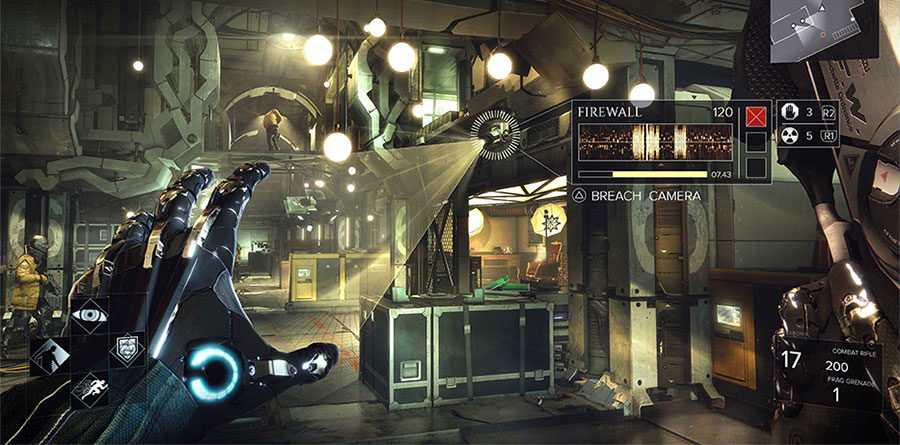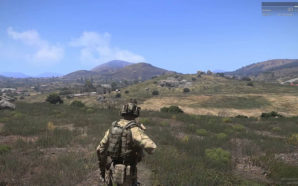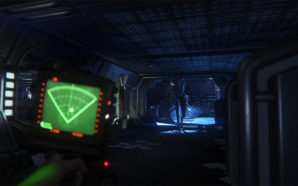Square Enix Messing with the Game?
Deus Ex: Mankind Divided has been out for a few weeks and everyone seems to love it. Eidos Montreal have taken the gameplay they introduced in their reboot of the cyberpunk action-RPG franchise and have polished it to a mirror shine. The visuals and environment design continue to portray a plausible near future with people dealing with the social and financial ramifications of transhumanism for better and for worse. There’s even a clear political statement and philosophy at play concerning police brutality and profiling through the game’s world, making this installment particularly topical. Yet while I was playing through agent Adam Jensen’s attempts to infiltrate secret facilities, uncover the machinations of the world-controlling Illuminati and throw giant crates at people, there was an unsettling feeling that something wasn’t right. Some overwhelming feeling that the experience Eidos Montreal created was heavily cut down and suppressed by some shadowy overseer. After connecting the dots, it turns out there is a group messing around with this game: they’re called Square Enix.
Square Enix is a publisher that has been actively trying to find alternative payment models and methods for distributing their games, and most of the time it feels more like a means of trading in long-term customer loyalty for short-term financial gain by way of popular trends than an attempt at payment model diversity. Their dip into free-to-play mobile gaming began with the maligned Final Fantasy All The Bravest, a shallow brawler that deliberately banked on nostalgia, basically played itself, and its form of simulated psychological gambling tactics would make a Las Vegas casino seem tame. But the Final Fantasy brand is one of the most influential and beloved in the industry so many was made short-term. The more recently released Final Fantasy Brave EXVIUS is a marginal improvement but still retains a lot of All The Bravest’s less appealing features.
The next big issue came with the early 2014 3DS Release, Bravely Default. A fantastic JRPG that went back to its basic roots with modern polish and refined technique. It sold well enough to get a sequel and got unanimous praise from critics and longtime fans, I should know I was one of them. But the biggest stain on the otherwise superb experience was it smuggling in microtransactions in the form of special drinks that could earn you extra moves in battle. It was such a downplayed feature it was written off as a harmless addition than a serious problem, especially considering the dangerous mindgames at play when microtransactions are deliberately implemented. So downplayed that it feels like it wasn’t an intended part of the studio’s vision but rather something they had to include by those that signed their paychecks.
Then there was their recent foray into episodic gaming with the latest Hitman game. A series that was always sold as a full retail experience with complex levels and satisfying cerebral gameplay was effectively cut up into smaller pieces and sold one section at a time. The game’s fifth chapter is out and players seem to enjoy it just fine, but most tend to forget that when it was first announced at E3 it was marketed as a full priced retail premium experience before it was hastily announced the whole thing would be episodic. IO Interactive have positively spun this change as a means to be more hands-on with player feedback, but its pretty clear that it was done by publisher demand in order to chase the trend set by TellTale Games’ success. Usually episodic gaming is paced and designed around such chunks of content so for all of IO Interactive’s talent at hitting the ground running, it shows a level of recklessness in Square Enix’s decision making.
Show me the Money
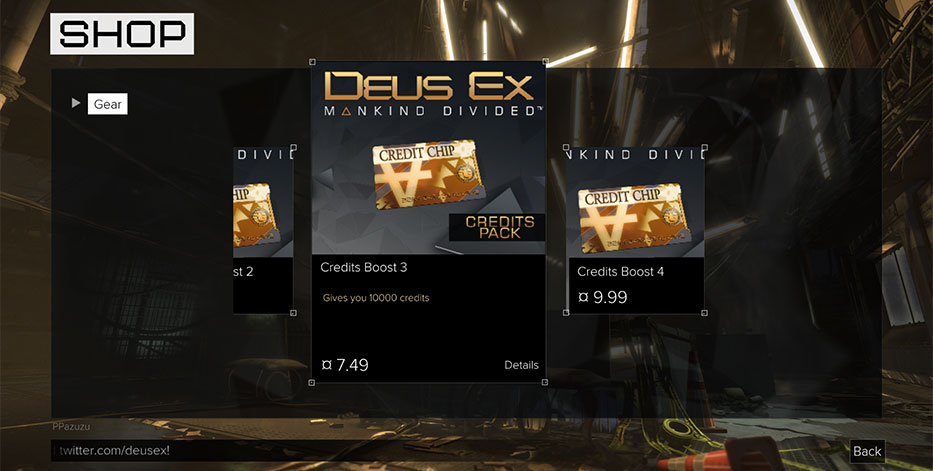
Which brings me back to Deus Ex: Mankind Divided because it seems to be suffering from an unholy combination of these games’ worst additions. The digital storefront for Mankind Divided is full of in-app purchases, everything from upgrade points to in-game money that can be bought with a few extra dollars, which is especially offensive for a game that is already being sold as a full premium experience. It also undermines all the hard work the studio put into their pacing and level design, which for a company that specializes in videogame production feels blasphemous.
There’s an online mode called Breach that feels like an online free-to-play game with the way it hammers you over the head with psychological pressure to buy upgrades and weapons for your digital avatar, all of which has no bearing whatsoever on Deus Ex’s single-player content. But worst of all, it actively weakens and denigrates its core experience to sell additional levels and sections for extra money.
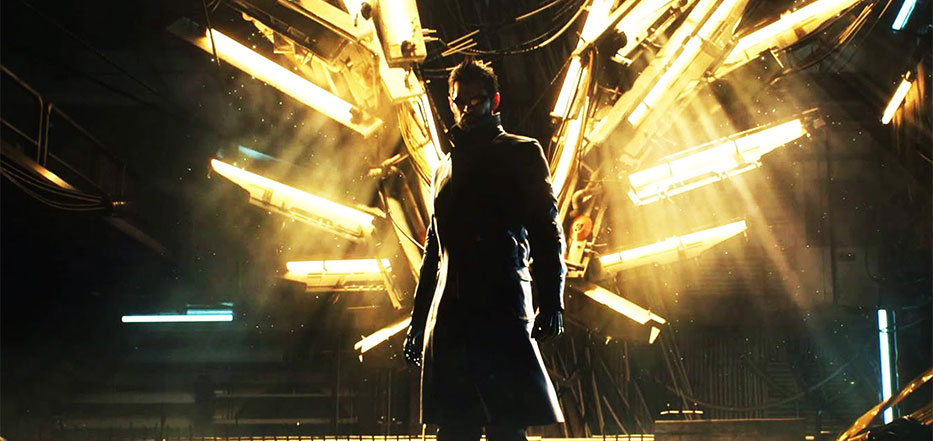
With a plot that’s built around conspiracies, shifting alliances and well-crafted mysteries, Jensen’s Stories is the interactive equivalent of tearing out chapters from a book, placing them back in at random points then charging you for the privilege
The greatest insult was the “addition” of Jensen’s Stories. For all of the quality and polish that Eidos Montreal put into the latest Deus Ex game, the greatest weakness of the whole thing was its underwhelming narrative and abrupt ending. Much like Peter Jackson’s hated return to Middle-Earth with the Hobbit films, the second installment juggled way too many balls in the air and then just cut to the credits because trilogies are a thing. But unlike The Desolation of Smaug getting a bunch of fluff shoe-horned in, Mankind Divided felt much smaller in scale and consequence than its predecessor, Human Revolution.
It seems story content will be coming for a price, but not flawlessly integrated into the game’s world like critical darlings The Witcher 3 or Bloodborne. Instead, such content is accessed from a completely separate menu and is treated as a completely separate level and section, much like a chapter in Hitman 2016. With a plot that’s built around conspiracies, shifting alliances and well-crafted mysteries, Jensen’s Stories is the interactive equivalent of tearing out chapters from a book, placing them back in at random points then charging you for the privilege.
At What Cost?
What’s especially sad about this whole debacle is that I could feel these abrupt changes from the very first mission. The microtransactions weren’t shaking me down for cash nearly as badly as other games and I simply left Breach mode alone because of how obviously insubstantial it was, which is usually a sign they weren’t originally intended by the developer, but the minute I found out an entire point of intrigue set up within the game’s first hour was only going to be paid off in a separate Jensen Story, the pre-order bonus mission nonetheless, I lost any expectations and standards for what Mankind Divided was delivering me for my upfront sixty dollar investment despite the clear amount of devotion and passion infused into the experience by Eidos Montreal.
Mankind Divided didn’t need or ask for this. On its own merits as a videogame and as a piece of interactive art, it was perfectly fine as is. Yet, as a fan of the series and as a customer I feel ripped off and taken advantage of by the practices imposed by Square Enix. For all the profit it is making the company now, consumer goodwill runs out, and it is usually not pretty when it does.




